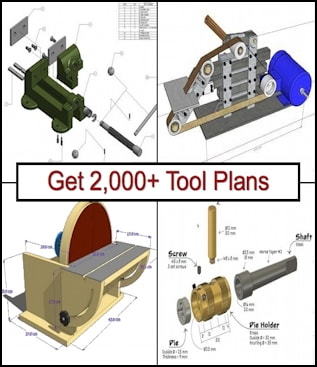The Secret Life of Components: Screw Threads. By tim hunkin. 56:05 video:



The Secret Life of Components: Screw Threads. By tim hunkin. 56:05 video:

HomemadeTools.net founder (2012) and CEO
Join thousands of us, and start building your own tools today.
Floradawg (Apr 27, 2022), KustomsbyKent (Apr 22, 2022), nova_robotics (Apr 23, 2022), RetiredFAE (Apr 21, 2022), Toolmaker51 (Apr 24, 2022)

While this video was a bit long, I slogged through it and found it fairly interesting as Tim has entertaining approach to the explanations, and it's also quite interesting seeing his various automations that he has built over the years. Being American, it's also entertaining hearing the British terms for certain tools and parts....
Finisher = belt sander
Plodger? = spud bar
spanner = wrench
and so on...
I did want to make a few suggestions.
He said he uses his taps in his drill mostly for good results. Only special taps work well for this. A regular 4-flute tap is not intended for this type of high speed tapping, and will tend to break the tap quite easily. I used to hate tapping holes, getting it started, and risk of breaking the tap. Then I worked at a large corporation in the maintenance group for an internship in college, and those guys showed me the special taps for speed tapping. These taps have a forward cutting portion at the end of the tap that pushes the chip forward of the tap. They are also stronger taps as they are usually 2 or 3 flutes. These are for industrial manufacturing to speed tap holes in plates, etc. They have a long life, and are now what I exclusively use for tapping with my projects. The technical name for them: Spiral Point tap
Here's a link: https://www.mscdirect.com/product/details/41113234
I have them for 10-24, 1/4-20, 5/16-18, 3/8-16, and 1/2-13 as these are the common sizes I use all of the time.
He also demonstrates breaking a screw extractor... quite frankly, those screw extractors are for much smaller screws, not the large bolt that he demonstrated on.
If you have to use a screw extractor, I have found much better success with the long style of extractors.
You drill a hole down into the bolt that is broken off, and drill it out as large as you can, so that you're almost as big as the inner diameter of the threads. Then insert the screw extractor and it will usually come right out. By drilling it out much larger, the bolt threads are weakened, and it helps loosen the bolt that is stuck. When the screw extractor goes in, it can grip the stuck bolt better, and flex it and loosen it.
Here's the style I've had most success with:
https://www.mscdirect.com/product/details/07234057

BuffaloJohn (Apr 22, 2022), EnginePaul (Apr 23, 2022), nova_robotics (Apr 23, 2022), Toolmaker51 (Apr 24, 2022)
I too, will watch an engaging personality. That hour went by quickly.
We all have interconnected bits of experience; so, details reinforce those. With some luck, other tips promote new work savers as well.
With his displays being operative on different parts of the globe, that's credentials enough for me. I'll bet though, he has access to a bigger shop as well.
Sincerely,
Toolmaker51
...we'll learn more by wandering than searching...
I do sometimes use a drill to tap holes. It all depends on the precision that you are after and the speediness it offers. I tend to have better luck with thinner material and also on very hard steel I probably wouldn't use that method.
One sort of thread he didn't discuss is the buttress thread. To be fair it isn't normally used by mechanics and machinists. It was common on caps for toothpaste, ointments, etc., which makes it easier to start the thead to get the cap on easily.
Stupid is forever, ignorance can be fixed.

There are currently 1 users browsing this thread. (0 members and 1 guests)
Bookmarks